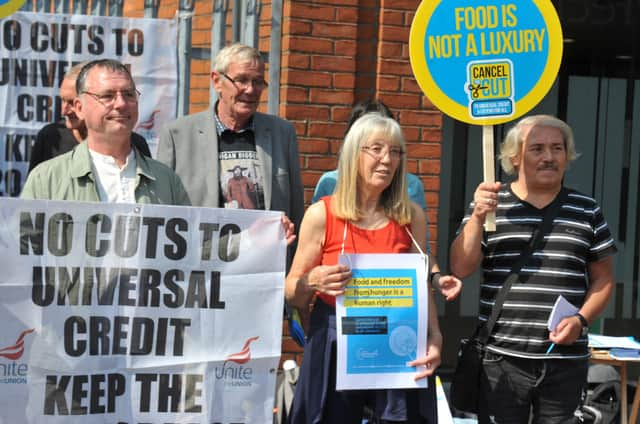How Universal Credit cut will hit homeless under-25s - Paul Noblet


If the Chancellor, Richmond MP Rishi Sunak, goes ahead with his decision to end the temporary £20 uplift to Universal Credit at the end of this month it will risk undoing much of the Government’s good work to support the most vulnerable during the pandemic.
Many young people, including those who are or have been homeless and can’t rely on financial support from their families, will once again be faced with choosing between paying their bills and putting food on the table.
Advertisement
Hide AdAdvertisement
Hide AdThe extra £87 a month that young people have received during the pandemic has made an especially huge difference because historically the benefits system has assumed that under-25s who have to make a claim because they are unemployed or are on low wages can live at home or rely on their family for help.
However, thousands of young people do not have the safety net of a family home so face exactly the same costs as their peers.
Take Morgan, for example. He spent about six months sofa-surfing and sleeping under bridges in Leeds and Bradford, after relations with his family broke down in 2018. In a radio interview earlier this month he laid out what not having enough money to simply live on means for him: “If I know I need the money for things other than food and I’ve not got much to spend, then I will put it on the other things…I can last for a while without eating. I’ve been trying to put my mind off the hunger by either doing exercise, or maybe doing a bit of work on my computer, or maybe talking to friends, or just playing games to take my mind off of it.”
According to the Resolution Foundation the proportion of 16-24 year olds claiming income-related benefits increased from nine per cent to 15 per cent during the pandemic, reflecting the disproportionate impact unemployment has had on young people.
Advertisement
Hide AdAdvertisement
Hide AdAt the same time we know that 120,000 young people approached their local council for help in the 12 months before the first lockdown because they were homeless or at risk of becoming homeless.
That is why Centrepoint, and more than a hundred other organisations including the York-based Joseph Rowntree Foundation, are urging the Government to keep the Universal Credit uplift in place.
Young people, especially those who have been homeless or are currently living in hostels run by charities like Centrepoint, can’t be left to choose between staying warm this winter or putting food on the table whilst they wait for the economy to pick up.
The Government argues that it has spent a great deal of taxpayers’ money on support during the pandemic and that it is right to withdraw support as things get back to normal.
Advertisement
Hide AdAdvertisement
Hide AdBut things simply aren’t back to normal yet, especially in areas of the North that the Government has promised to level-up.
Getting young people back into work takes time, it takes training, it takes creating new jobs. Crucially, this is something which MPs across the House of Commons recognise. In July the former Conservative Party leader Sir Iain Duncan Smith and other former Conservative cabinet ministers jointly wrote to the Chancellor urging him to keep the £20 uplift in place to give people the time to find work and get back on their feet.
Over 50 years of supporting homeless young people we have seen what the right support at the right time can do. Sometimes that means putting a roof over someone’s head in places like our services in Barnsley and Bradford. Often it means supporting young people to gain new skills and qualifications. And sometimes it means making sure people have enough money to cover the basics like food, heating, and the bus fare to work or college.
Investing in a vulnerable young person when they need it most can break the cycle of homelessness and help that individual avoid the prospect of months or even years living on and off the streets.
Advertisement
Hide AdAdvertisement
Hide AdIt can help them get into work and off benefits altogether. It can mean that they have the opportunity to achieve their potential which is not just the fair thing for that young person but is good for our communities and our economy.
Paul Noblet is Head of Public Affairs for the youth homelessness charity Centrepoint.
Support The Yorkshire Post and become a subscriber today. Your subscription will help us to continue to bring quality news to the people of Yorkshire. In return, you’ll see fewer ads on site, get free access to our app and receive exclusive members-only offers. Click here to subscribe.
Comment Guidelines
National World encourages reader discussion on our stories. User feedback, insights and back-and-forth exchanges add a rich layer of context to reporting. Please review our Community Guidelines before commenting.